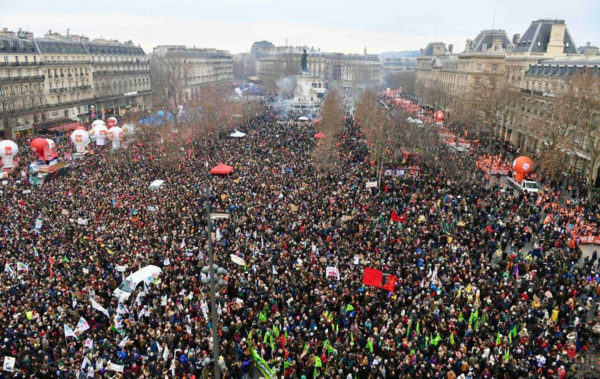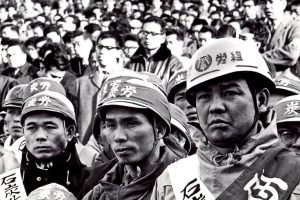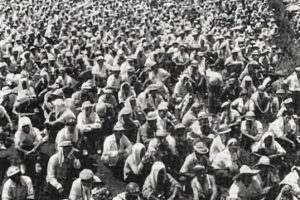The Japanese archipelago is shrouded in eerie silence. It exposes the powerlessness and apathy of the Japanese people to resist the abuse of power by the Fumio Kishida government. Under the slogan of "Tomorrow's Ukraine", a major military expansion and military shift was decided to acquire the ability to attack enemy bases and double the defense costs . In 2023, Japan will be hit by serious inflation. Wage increases are not expected and incomes do not grow. Even so, there were no large-scale demonstrations or strikes by the people here . On the other hand, in Western European countries, large-scale civil demonstrations and strikes of 1.5 to 2 million people expressing anger and protest against the sudden inflation and pension reforms, including the sharp rise in energy prices due to the Ukraine war, are occurring frequently. In Japan, 800 people (announced by the organizer) anti-military demonstrations around the Diet organized by citizens' groups in December 2022, and 1,100 people (same) for Communist Party-affiliated demonstrations are in a terrible situation. In recent years, the 2015 protests against the new security legislation, which are said to have reached an exceptionally high number of 100,000 (same), have highlighted the transitory nature of the demonstrations and the subsequent progress of Japanese society becoming a fascist unification .
<Reference article: Article published in May 2022 “Voting rights, basic labor rights… Japan throws away democracy or new support system under US control”>
■ Differences in belief in the right to resist
Intergovernmental negotiations alone are not enough to bring the Ukraine war to a ceasefire. It is essential that citizens protest against the governments of the North Atlantic Treaty Organization (NATO) member countries, which almost overlap with those of the European Union (EU), for complicity in the war, and to demand ceasefires and peace. The free solidarity and political participation of civil society groups, labor unions, and even individual citizens who voice their anger at the unfairness of war have had a considerable impact on the policy decisions of governments around the world.
Take France for example. Formed in February 2016 on the model of the German Left Party , the political party is increasing its presence as the core of the reorganization of the French Left . In the 2022 presidential election, party leader Melenchon finished third with 22% of the vote in the first round. Manuel Bompard, Member of the European Parliament, who served as Melenchon's campaign director, sent the following social media during the election period.
“While the majority of French people believe Putin is responsible for the war in Ukraine, 68% believe NATO is also to blame, especially 82% among those close to the 'France of Disobedience' party. , 78% of Green Party supporters and 66% of Socialist Party supporters think so .
In fact, candidate Mélenchon has made his confrontational axis with incumbent Macron clear by appealing for withdrawal from the North Atlantic Treaty Organization (NATO) in the presidential election. Originally, France had a tendency to avoid NATO, which tried to control continental Europe under the leadership of the United States and Britain . is . France's refusal to join the European Community (EC) twice in the 1960s also showed strong distrust and wariness of France's Anglo-Saxon alliance with the United States.

[Pictured] Jean-Luc Mélenchon, leader of 'France in Disobedience'. Many media outlets have portrayed the party as a far-left, left-wing populist. However, it is possible that it will lead the European Left Party, which was formed in 2004 as an international organization of left - wing political parties in European countries , and have a significant impact on the political trends of the EU.
In an interview with French television in December 2022, President Macron said, "If Russia agrees to talks to end the war in Ukraine, the West should consider Russia's security needs. " "We need to prepare the structure and think about how to provide assurances when Russia returns to the negotiating table . " Ukraine and the three Baltic states are vehemently opposed.
After the end of the Cold War, Germany and France, which are at the core of the formation of the European Union (EU), aim to build a pan-European security system that includes Russia without the United States from a long-term perspective. This was explained in detail in the article published on January 7, "Germany and the United States' Offense and Defense over Russia: Pan-European Security Arrangements and the Brzezinski Concept." Based on this, the true meaning of Macron's remarks can be understood. The background to the two Russia-Ukraine agreements (the Minsk Agreement) mediated by Germany and France in 2014 and 2015 is similar.
As discussed in the May 2022 article "Voting rights, basic labor rights... Japan throws away democracy or the new support system under US administration", due to the rule of the National Center Labor Union "Rengo" that integrates with the ruling party, the Liberal Democratic Party, Strikes demanding wage increases disappeared. In Japan, the original labor movement has virtually disappeared. At the same time, the coalition's thorough elimination of the Communist Party has made it impossible for the opposition parties, which have been divided into small parties and weakened, to fight jointly in elections and to unify the candidates, thereby boosting the permanent rule of the Liberal Democratic Party.
France has five main national center unions, the oldest of which is the General Confederation of Labor (CGT), which has survived as a national union by function since its formation in 1895. According to 2015 OECD statistics, the unionization rate in France is only 7.7%, lower than Japan's 17.7 % . However, the coverage rate of collective agreements in Japan, which is a company-based union, is 16%, while in France, which is an industry-based union, it is 92%. In industrial unions, collective agreements, which are agreements on working conditions, cover most workers regardless of unionization rate. In Germany, the unionization rate is on par with Japan, but the labor agreement application rate exceeds 60%.
Members of industrial unions negotiate with industrial capital and managers ( Keidanren, SME Federation, etc.) to protect workers , and the working conditions they win benefit most workers. Therefore, many workers respond to union demonstrations and calls to strike. The joint struggle between labor unions and civic groups is also strong. It stands in stark contrast to the Japan Automobile Federation, Denki Rengo, and UA Zensen, which form the mainstream of the Japanese federation, which has long abandoned the right to strike .
■ European citizens stand up
 In France, on January 19, 2019, a large-scale demonstration took place to protest against the pension reform plan proposed by the Macron administration. According to the General Confederation of Labor (CGT), more than 1.5 million people took part in protest demonstrations in about 200 locations nationwide, and about 2 million people went on strike all at once. Swollen and overstaffed, he called for the government to withdraw its pension reform proposal. A group of young people will also join the group on the 21st, and they will continue to take action to try to withdraw the bill. Eight national center unions, including the CGT , staged even larger demonstrations and strikes on January 31.
In France, on January 19, 2019, a large-scale demonstration took place to protest against the pension reform plan proposed by the Macron administration. According to the General Confederation of Labor (CGT), more than 1.5 million people took part in protest demonstrations in about 200 locations nationwide, and about 2 million people went on strike all at once. Swollen and overstaffed, he called for the government to withdraw its pension reform proposal. A group of young people will also join the group on the 21st, and they will continue to take action to try to withdraw the bill. Eight national center unions, including the CGT , staged even larger demonstrations and strikes on January 31.
In France, the 'yellow vests' movement , which started online in May 2018 and took to the streets on November 17, 2018 against the fuel tax , takes notice every Saturday. It has become the longest-lasting demonstration in France since World War II , and in 2019, it is fighting with the French National Railways and the Paris Transport Authority, which went on a long-term strike for 47 days in opposition to the pension reform bill. .
The major trade unions in France not only represent their members, they represent workers in all sectors of industry. For the common good, it therefore has the historical character of shaping collective action across industry and workplace differences. This anti-government movement is not limited to industrial workers, but also strikes and protests in a wide range of fields, including national and local government employees, medical workers, social workers, retailers, teachers, students, and farmers. It's becoming
The major industrial unions made the following statement:
"Every day we are affected by the anti-social policies of President Macron and employers' organizations, especially the Français Federation.
Inflation is set to hit over 7% in early 2023, and food prices have soared to over 12% today. Meanwhile, wages, pensions and minimum social security are stagnating. You have to fight, clash, and strike to extract wage increases from your employers.
The government also wants to introduce a mandatory retirement age of 65, extend the number of years of service required to receive a pension, and abolish so-called "special" systems. We oppose it, as do the majority of French people and workers. The right to rest in good health after a lifetime of hard work is a social achievement of the labor movement and its organizations.
Only social movement groups, labor unions, and political parties can unite over a long period of time and carry out large-scale campaigns to break through this unjust systemic deterioration and open up a new path. 60-year-old retirement system, re-enactment of social security, raises in minimum wages, salaries, pensions, and social security, rent cuts, price freezes on daily necessities, protection of ecosystems, investment in transportation, medical care, and education, and pursuit of excess profits We need to build taxation, guarantees of youth autonomy, and the right to effective and advanced unemployment insurance for all unemployed. ”
In the UK, on February 1, 100,000 school teachers and other civil servants from various sectors gathered together to go on strike with a scale of 500,000 people. Almost half of the schools were closed. Demonstrators filled government offices and the British Museum was closed due to staff strikes.
Since 2022, when the Ukrainian War began, prices have soared into double digits annually, and there have been a series of strikes and pickets demanding significant wage increases . Transportation agencies such as subways, post offices, harbors, garbage collection, etc. , and young staff from hospitals and universities stood up. In mid-December 2010 , the first large-scale strike of nurses at public health institutions took place.
In Germany, on March 13, 2022, 130,000 people held anti-war demonstrations across the country following the outbreak of the Ukraine War. Demonstrations and strikes have occurred one after another in various workplaces and places in response to soaring prices, which began with the suspension of natural gas supplies from Russia as a result of joining economic sanctions against Russia. On March 17, ground staff at seven major German airports staged a 24-hour strike demanding better working conditions.
Citizens of Western countries have a firm belief in democracy , the right to resist , and basic labor rights , saying that "the only way to protect their livelihoods as workers is to go on strike."
■ The Japanese disease of “eternal obedience”
Japan has become a country with very few strikes in the world. There will be just 55 strikes in 2021, two fewer than the previous year . And very little of it made the news.
In March 2022, 40 Vietnamese workers on a ranch in Hokkaido went on strike . The labor dispute arose when the company more than doubled the utility bill for the dormitory from 7,000 yen to 15,000 yen. As a result of the strike, the company reportedly reinstated dismissed workers.
In December of the same year, three part-time lecturers at Tokai University went on strike in opposition to the termination of their employment. One of the part-time teachers had worked for 18 years and had the right to request a contract change from fixed-term employment to indefinite-term employment, but the school did not accept it and decided to terminate the employment. The strike was ignored and the suspension was not rescinded.
According to ILO statistics, there were about 44,000 strikes worldwide between 2010 and 2019. Looking at the number of strikes by country in recent years, Japan has 31 (2013). Brazil 873 (2012), South Korea 134 (2018), Germany 1526 (2018), Australia 256 (2018), France 128 (annual average from 2010 to 2019) Such.


[Photo: The 1960 Miike Dispute, which became a representative labor dispute after the war]
According to Japan's Ministry of Health, Labor and Welfare statistics, the number of post-war labor disputes fluctuated between 700 and 800 between 1946 and 1959. Since 1960, over 1,000 cases have peaked at 5,127 in 1974. Since then, the number of cases fell below 1,000 in 1981, and has decreased year by year. It seems that the traffic general strikes of the 1960s and 1970s were forgotten.
Regarding the background of Japanese people's renunciation of basic labor rights, I wrote in May 2022, "Voting rights, basic labor rights... Japan abandons democracy or new rule support system under US control".
- "Japan's economic power, which peaked in the 1980s with post-war reconstruction and high economic growth, began in the 1990s and entered a marked decline after 2000. The all-out system was stripped of its rights by the new defeat of the long-term economic decline. Abandonment of the right to vote, the right to organize, and the right to strike, suppression and abandonment of freedom of expression in connection with the prejudice and shrinkage of those in power in the established media, and indifference to rallies and demonstrations . Criticism and anger toward politics and society are suppressed and collective depression has developed and spread throughout society.
- Starting with the Worker Dispatch Law of 1986, there was the privatization of public companies such as the National Railways, the Dentetsu Public Corporation, and the Monopoly Corporation, which led to the dissolution of the Japan Socialist Party. As a result of the introduction of neo-liberal policies such as birth, introduction of a discretionary labor system, increase in non-regular labor, reduction in the unionization rate and drastic reduction in strikes , the groundwork for a new ruling support system was laid. The Nakasone Cabinet (1982-1987) advocated the ``post-war political total settlement'', which is an amalgam of a return to conservative conservatism and the introduction of neoliberalism originating in the United States. It was intended to be dismantled. ”
- Also, in November 2021, in the article "Abolition of the Japan-U.S. Security Treaty and Independence from the U.S. Again as a Point of Issue (Part 1) Modern Japan's Third Phase 2", under the name of the total settlement of postwar politics, I will discuss the dismantling process of postwar democracy. I wrote.
-
“Following the collapse of the Soviet Union, the United States embarks on the destruction of Japan's unique economic system, which should be contained as another enemy. The aim was to dismantle the Japanese-style management system that inherited the 1940 wartime all-out system advocated by Yukio Noguchi, professor emeritus at Hitotsubashi University, in the 1990s . Lifetime employment, seniority system, in-house unions, bureaucrat-led convoy system that protects each industry as a whole, huge companies that have acquired overwhelming price competitiveness by acquiring and plundering a huge number of subcontracting affiliates, 6 major corporate groups It is a Japanese-style system that consists of the existence of a corporate group with the main bank at the top.
In addition to the wartime all-out system theory, as symbolized by the corporate warrior mindset that caused many deaths from overwork , it must be emphasized that for the employees of postwar Japanese companies , the company was a house to serve. Their appearance was reminiscent of "house = vassals who devote themselves to the company". This pseudo-feudal system, which is extremely inefficient in terms of productivity, is a collectivist system that treats "our company" as if it were a lord or feudal lord . became . Japanese society was far from an open system that fully respected the free way of life of individuals. This was the reality of post-war democracy in Japan in the 1980s, 40 years after Japan's defeat in the war.
Japan's major media companies and their reporters, who were obsessed with the idea of "our company," declared that their mission was to "protect democracy, respond to the people's right to know, and monitor power." . The core of their mentality was the ethos of the above-mentioned Japanese system. Their real image was that of workaholic patients who were obsessed with the delusion of a "permanent battlefield" that respected sacrifice in their private lives, represented by "night raids in the morning."
Under these circumstances, the enactment of the Dispatch Labor Law in the 1980s led to the destruction of Japanese-style employment practices by creating a large number of non-regular dispatched workers. Under the name of unification of the labor front, he formed the ``Rengo,'' which effectively supported the Japanese conservative government, and wiped out and dismantled the anti-American resistance forces in Japan . ”
- Looking at the span of several hundred years, the 30-year period from the defeat in World War II to the 1970s in Japanese history, the vows against war under the Article 9 Constitution and the upsurge of the anti-war peace movement, can be traced back to the prewar period of the 1910s and 1920s. It may be said that it was similar to the short-term, modest democratic and liberal trend of ``Taisho Democracy''. From the 1930s onwards, the Peace Preservation Law became violent and the age of military fascism emerged. In the 2020s, Japan has completely watered down Article 9 of its constitution and become a military power under U.S. control.
- After absolute submission to the pre-war modern emperor system, what awaited us was absolute slavery to the warring state of America. Will the Japanese live under "eternal obedience"?
